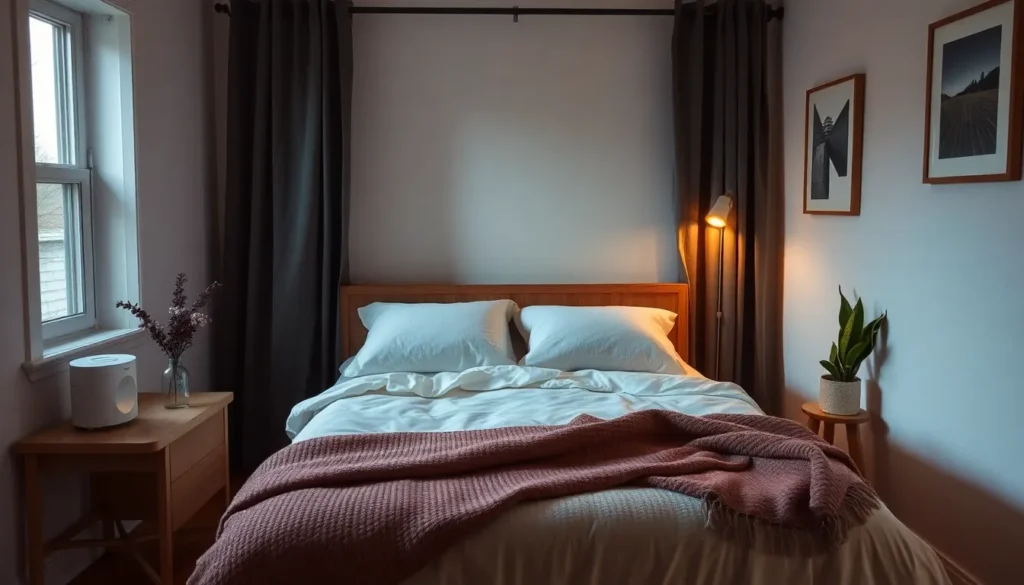In a world where counting sheep feels more like a marathon than a bedtime ritual, many are left tossing and turning instead of drifting into dreamland. Sleep isn’t just a luxury; it’s a necessity for a sharper mind and a happier life. But let’s face it—some nights, the only thing more elusive than a good night’s sleep is the remote control in the couch cushions.
Table of Contents
ToggleUnderstanding Sleep
Sleep serves as a fundamental component of health and well-being. Many people underestimate its impact on daily life and overall performance.
Importance of Sleep
Quality sleep supports cognitive functions such as memory and decision-making. Insufficient sleep leads to impaired concentration and mood fluctuations. Research shows that chronic sleep deprivation can elevate the risk of chronic conditions, including obesity, diabetes, and cardiovascular diseases. Studies indicate adults require seven to nine hours of sleep per night for optimal health. Additionally, restorative sleep influences immune function, emotional regulation, and productivity levels.
Stages of Sleep
Sleep occurs in cycles, consisting of distinct stages that facilitate various restorative processes. Non-REM sleep comprises three stages, transitioning from light sleep to deep sleep. Deep sleep is crucial for physical recovery and growth. REM sleep, which follows, accounts for vivid dreaming and enhances memory consolidation. A complete sleep cycle lasts approximately 90 minutes, repeating several times throughout the night. Adults generally experience four to six complete cycles per night. Understanding these stages helps emphasize the importance of uninterrupted sleep for overall health.
Creating A Sleep-Friendly Environment

Creating a sleep-friendly environment is vital for achieving quality rest. This environment can significantly impact sleep patterns and overall health.
Optimal Bedroom Conditions
Optimal bedroom conditions promote restful sleep. A comfortable mattress enhances support and can lead to better sleep quality. Ideal room temperatures range from 60 to 67 degrees Fahrenheit, which facilitates a cooler environment conducive to sleep. Darkness plays a crucial role; blackout curtains can block outside light. Adding minimal decor reduces distractions, allowing the mind to unwind. Maintaining an organized space contributes to reduced stress levels, further supporting sleep.
Reducing Noise And Light
Reducing noise and light helps create a tranquil sleep environment. Soft sounds, like white noise machines, can drown out disruptive noise. Using earplugs may be beneficial for light sleepers. Dim lighting is essential; consider using low-wattage bulbs in the evening. Lighting adjustments help signal to the body that it’s time to wind down. Additionally, removing electronic devices that emit blue light promotes better sleep. Establishing a calm atmosphere directly influences the ability to fall asleep faster and stay asleep longer.
Establishing A Sleep Routine
Establishing a sleep routine enhances overall sleep quality. Adopting specific habits can make a significant difference.
Consistent Sleep Schedule
A consistent sleep schedule promotes better rest. Going to bed and waking up at the same time daily helps regulate the body’s internal clock. For adults, sticking to a sleep routine aligns with the recommended seven to nine hours of sleep per night. Being consistent, even on weekends, reinforces this pattern. This approach reduces the effort needed to fall asleep and wake up, making mornings feel less daunting.
Pre-Sleep Activities
Engaging in relaxing pre-sleep activities signals the body to prepare for rest. Reading, meditating, or gentle stretching are effective ways to wind down. Avoiding screens also plays a crucial role; blue light emitted by devices interferes with melatonin production. Establishing a calming ritual, such as taking a warm bath or practicing deep breathing, can further enhance relaxation. These habits create a transition from daytime alertness to nighttime tranquility.
Lifestyle Changes For Better Sleep
Making certain lifestyle changes enhances sleep quality and promotes better overall health. Two significant areas to consider are diet and exercise.
Diet And Nutrition
Balanced nutrition directly impacts sleep patterns. Foods rich in magnesium, like almonds and spinach, promote relaxation. Additionally, incorporating complex carbohydrates such as whole grains can help the body produce serotonin, which aids in sleep. Avoiding caffeine in the afternoon ensures it doesn’t disrupt nighttime rest. High-sugar snacks may lead to energy spikes, hindering wind-down efforts. Instead, focus on light snacks before bedtime, such as yogurt or bananas, which can contribute to a restful night.
Exercise And Physical Activity
Regular physical activity significantly improves sleep quality. Engaging in aerobic exercises, like running or swimming, raises body temperature and induces a post-exercise drop that promotes sleepiness. Aiming for at least 150 minutes of moderate exercise weekly can yield substantial benefits. Evening workouts, however, should be avoided as they may energize rather than relax the body. Stretching or yoga is beneficial if done close to bedtime. Finding enjoyable forms of movement encourages consistency and makes it easier to incorporate into daily routines.
Managing Stress And Anxiety
Managing stress and anxiety effectively promotes better sleep. Individuals often experience stressors that disrupt their ability to unwind, making relaxation techniques essential.
Relaxation Techniques
Practicing deep breathing enhances relaxation by calming the mind. Guided imagery offers a mental escape, allowing individuals to visualize peaceful settings. Progressive muscle relaxation assists in releasing tension throughout the body, promoting a sense of calm. Engaging in activities like warm baths or listening to soothing music also fosters relaxation, preparing the body for sleep. Implementing these techniques right before bedtime creates a more tranquil environment conducive to rest.
Mindfulness Practices
Incorporating mindfulness practices into daily routines helps reduce anxiety levels. Meditation provides a focused moment to declutter the mind and invites tranquility. Journaling allows individuals to express thoughts and emotions, alleviating stress. Yoga encourages physical movement that connects the body and mind, enhancing overall well-being. Consistently engaging in these practices can significantly improve sleep quality by mitigating the effects of daily stressors.
Prioritizing sleep is essential for maintaining overall health and well-being. By implementing effective sleep tips such as creating a conducive environment and establishing a consistent routine, individuals can significantly improve their sleep quality.
Incorporating relaxation techniques and managing lifestyle choices can further enhance the ability to achieve restful sleep. Ultimately, investing time and effort into sleep hygiene not only boosts mental clarity but also fosters a happier and healthier life. Embracing these strategies can transform sleep from a nightly challenge into a restorative experience.






